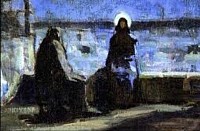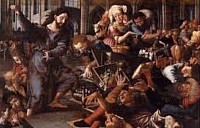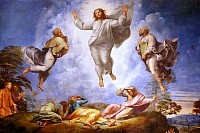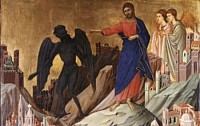This blog will present Gospel Enquiries built on the Gospel readings for the Sundays of Lent, Year B.
Week 4: See and do what is done in God
Introduction
I taught Religious Education in Catholic schools for many years and, whether correctly or incorrectly, I often thought about the subject as a journey from the head to the heart. What I hoped and prayed for was a journey from the heart to the head would take place in every student I taught.
The Gospel reading for the Fourth Sunday of Lent presents the head and heart as a dipole: there is movement between the two “extremes,” much like breathing. I am reminded at this point in writing of a song I sing from time to time: “Breathe in me, Breath of God, my spirit yearns for you.” The Holy Spirit accompanies us as we journey through life and through the power of the Spirit, we seek to conquer our temporal and eternal destinies, as Cardinal Joseph Cardijn spoke about to the leaders in the Young Christian Workers movement last century.
Lent is a good time to think about our shared Christian faith as paradox. Nicodemus chooses to visit Jesus at night, presumably because he was afraid of being seen with Jesus. God says, “I can work with that.” Through Jesus, God leads us out of darkness into light, just as he led his People out of slavery in Egypt and into the Promised Land; and just as he will lead us from darkness to light when we celebrate the Easter Vigil in a few weeks from now.
The Gospel
Jesus said to Nicodemus:‘The Son of Man must be lifted up as Moses lifted up the serpent in the desert, so that everyone who believes may have eternal life in him.
Yes, God loved the world so much that he gave his only Son, so that everyone who believes in him may not be lost but may have eternal life. For God sent his Son into the world not to condemn the world, but so that through him the world might be saved.
No one who believes in him will be condemned; but whoever refuses to believe is condemned already, because he has refused to believe in the name of God’s only Son.
On these grounds is sentence pronounced: that though the light has come into the world men have shown they prefer darkness to the light because their deeds were evil.
And indeed, everybody who does wrong hates the light and avoids it, for fear his actions should be exposed; but the man who lives by the truth comes out into the light, so that it may be plainly seen that what he does is done in God.’ (John 3:14-21)
The Enquiry
See
- What is the context for this Gospel reading? Read chapter 3 of John’s Gospel to gain a clear view of the evangelist’s intention to draw out the themes of darkness/sin and death and light/redemption and resurrection. Take some time to think about how these themes play out in your life. Have you ever come to Jesus under the cover of darkness to seek answers to questions that bother you? What happened?
- What does Jesus reveal about God’s Will? Why does it have to happen this way, that Jesus “must be lifted up as Moses lifted up the serpent in the desert”? Is Jesus talking about the mystery of God and the mystery of sin and redemption?
- From what Jesus says, what are the consequences that flow from the Son of God being present in the world? Choose one thing he says that you find to be particularly relevant to you at present and list for yourself what is happening, when it happens and how often. Do you recognise Jesus being present in that part of your life? How do you acknowledge that to yourself and to him?
Judge
- On one level, we find ourselves in the middle of a chapter in Jesus’ life. Look at what has gone before this meeting with Nicodemus and what follows the meeting. What do you learn about other people’s perceptions of Jesus? How does Jesus address those perceptions in his conversation with Nicodemus?
- Step back from the story and look for other levels. Think about what his presence in the world says about the mystery of God. What do you want to acknowledge as being true about God?
- How is your faith challenged by what you have read and thought about? Is there anything here that Jesus says that gives you some comfort, some hope?
Act
- This Gospel is about the Easter experience. What do you want to change about society and its messages about Easter? Is Easter really only about Easter eggs, hot cross buns, tasty food, family and friends? A holiday? Or is Easter about paradox? About conquering sin and death? What do you want to change?
- What small action can you take that will contribute to bringing about this change? When and where will you carry out the action and how often?
- Who can you involve in your action and how, when and how often will you get them to participate in your action?
Author: Pat Branson
Image source: Wikimedia Commons (Creator), Picryl, Public Domain
Week 3: Take care of God’s home
Introduction
We have come a long way from the development of the mechanical clock by Benedictine monks in the thirteenth century to the smart watches that people wear today. More than seven hundred years ago, some saw an economic advantage to be gained from using the clock to control people’s use of time, a perversion of the desire to give glory to God that motivated the monks.
Lent is, among other things, a time for self-reflection oriented towards deepening our relationship with God, as followers of Christ. The Review of Life method of See, Judge, Act, which was developed by Cardinal Joseph Cardijn (1882-1967), provides us with another opportunity to engage in the process of transformation through faith in action.
In the Gospel reading for the Third Sunday of Lent, Jesus recognises the self-serving motivation of the sellers and money changers who use the Temple for their personal gain and acts to restore God’s justice.
The Gospel
Just before the Jewish Passover Jesus went up to Jerusalem, and in the Temple he found people selling cattle and sheep and pigeons, and the money-changers sitting at their counters there. Making a whip out of some cord, he drove them all out of the Temple, cattle and sheep as well, scattered the money-changers’ coins, knocked their tables over and said to the pigeon-sellers, ‘Take all this out of here and stop turning my Father’s house into a market.’ Then his disciples remembered the words of scripture: Zeal for your house will devour me.
The Jews intervened and said, ‘What sign can you show us to justify what you have done?’ Jesus answered, ‘Destroy this sanctuary, and in three days I will raise it up.’ The Jews replied, ‘It has taken forty-six years to build this sanctuary: are you going to raise it up in three days?’ But he was speaking of the sanctuary that was his body, and when Jesus rose from the dead, his disciples remembered that he had said this, and they believed the scripture and the words he had said.
During his stay in Jerusalem for the Passover many believed in his name when they saw the signs that he gave, but Jesus knew them all and did not trust himself to them; he never needed evidence about any man; he could tell what a man had in him. (John 2:13-25)
The Enquiry
See
- What happens here? List the elements of the story. Have you ever experienced God present and active in the world? If you have, choose one experience and list the elements that made up the event. made a stand based on justice for God? What happened?
- What does John tell us about Jesus that can be used to explain his action? What does his action reveal about his values?
- What impact did Jesus’ action of driving the money-changers and others out of the Temple have on those who witnessed his action or who heard about it?
Judge
- What do you think about the Temple incident? And Jesus’ reference to his body as a temple? Do you think he has justified his action?
- What should be happening in the Temple? How should people be treated? And if a person’s body is a temple, how should people be treated? Think of a situation in the world, or in your life, where treating one another as temples of God would bring about a better world?
- What does your faith tell you about which values are worth adopting? What has Jesus said and done that supports what you believe? How is your faith challenged by what you have read in this Gospel?
Act
- What do you want to change so that people choose good and avoid evil?
- What small action can you take that will contribute to bringing about this change? When and where will you carry out the action and how often?
- Who can you involve in your action and how, when and how often will you get them to participate in your action?
Author: Pat Branson
Image source: Jan Sanders van Hemessen: Christ driving the money changers from the Temple, Musée des Beaux-Arts de Nancy, Picryl, Public Domain
Week 2: The “Tabor” Experience
Introduction
Years ago, when I was carrying out research into religious education teachers’ personal constructs of revelation, one participant described to me her “Tabor” experience, meaning her encounter with the risen Christ. That brief, momentary experience changed her life profoundly. Her story bears witness to Pope Francis’ teaching about being accompanied by grace. He said in a homily he gave in 2013: “When God touches a person’s heart, he gives a grace that lasts a lifetime….” Like Peter, James and John, she left everything and followed Jesus.
In a similar vein, Fr Joseph Cardijn addressed those who gathered for the First International Congress of the YCW in Brussels in 1935 and spoke about the Three Truths. The Truth of Faith is a life lived in union with Christ risen and glorified. As Cardijn described it, this life is a fusion of the disciple’s temporal and divine destinies experienced and expressed in the present. And is this not the experience of Peter, James and John on that mountain, where Jesus was transfigured before them?
The Gospel
Jesus took with him Peter and James and John and led them up a high mountain where they could be alone by themselves. There in their presence he was transfigured: his clothes became dazzlingly white, whiter than any earthly bleacher could make them. Elijah appeared to them with Moses; and they were talking with Jesus. Then Peter spoke to Jesus: ‘Rabbi,’ he said ‘it is wonderful for us to be here; so let us make three tents, one for you, one for Moses and one for Elijah.’ He did not know what to say; they were so frightened. And a cloud came, covering them in shadow; and there came a voice from the cloud, ‘This is my Son, the Beloved. Listen to him.’ Then suddenly, when they looked round, they saw no one with them any more but only Jesus.
As they came down from the mountain he warned them to tell no one what they had seen, until after the Son of Man had risen from the dead. They observed the warning faithfully, though among themselves they discussed what ‘rising from the dead’ could mean. (Mark 9:2-10)
The Enquiry
See
- What happens here? Create a timeline or a storyboard to capture the elements of the story. Make notes about the elements that intrigue you, puzzle you, challenge you in any way. Have you ever had an experience like this? Or encountered the risen Christ in any event in your life?
- Why do you think this event happened? And why is it described in this way? Why do Moses and Elijah appear and converse with Jesus? And why does God speak from the cloud? Are there cultural and theological elements here to be considered?
- What does Jesus say to Peter, James and John as they come down the mountain? Why does he direct them in this way? How do they respond? How important is this part of the story to your experience of the world? Do you have experiences of the past, present and future in the one moment of encounter? And what has happened in your life because of this encounter?
Judge
- Why did Mark’s community need to hear this story? What was happening that threatened their faith in Jesus? And what about the world you experience: Why is this story important to Christians today? And during Lent?
- What does your faith tell you about the identity of Jesus? How is what you believe about Jesus affirmed by this story? How is your faith challenged by this story?
- Joseph Cardijn taught young workers that “the eternal destiny of each human being is incarnate, develops, and is achieved in temporal life always and everywhere – on earth as it is in heaven.” How is this teaching supported by Mark’s account of the transfiguration of Jesus? If you have never thought about your own life in this way before, what does this insight offer you now?
Act
- What needs to change in the world so that Jesus’ transfiguration impacts the lives of people around you in the way it impacted the lives of Peter, James and John?
- What small action can you take that will contribute to bringing about this change? When and where will you carry out the action and how often?
- Who can you involve in your action and how and when will you get them to participate in your action?
Author: Pat Branson
Image source: Slices of Light / Flickr / CC BY ND NC
Worth reading:
Joseph Cardijn. Challenge to Action: Forming Leaders for Transformation
Pope Francis (2015). Encountering Truth: Meeting God in the Everyday.
Driven into the Wilderness
Introduction
Lent is meant to be a “wilderness” experience; forty-days out of your comfort zone. When I was a child, Lent was like an adventure. I remember giving up having sugar in my cup of tea … and never went back to it.
Today, Lent offers me the opportunity to establish a new regime of practice, a new set of practices involving prayer, fasting and alms-giving. Preparing these Gospel Enquiries is a part of that practice, although, I must confess, I have been writing them religiously each week for the past eight months. It is my hope and prayer that I will recognise in a way I haven’t before the presence of the Spirit, sent by Jesus, in the world in which I live and love and hence grow in faith and hope and love.
The Gospel Enquiry is a tool to be used to assist in the integration of faith and life. Based on the Review of Life method, which Cardinal Joseph Cardijn (1992-1967) taught to young workers around the world, the Gospel Enquiry is really about faith in action. The three steps – See, Judge, Act – are presented in the form of questions intended to assist the reflection. May you be prompted to ask yourself (and others) better questions.
In his book, Grace: On the journey to God, Michael Casey OSCO, describes the regime of the Spirit as being “materially scarcely different from that expected of us from the outside.” He points out that its energies are derived from within. May this Lenten journey be an interior one with God’s Spirit as our guide and nourisher, and may it lead to change in the world around us because we ourselves are changed because we have journeyed with Jesus.
The Gospel
The Spirit drove Jesus out into the wilderness and he remained there for forty days, and was tempted by Satan. He was with the wild beasts, and the angels looked after him.
After John had been arrested, Jesus went into Galilee. There he proclaimed the Good News from God. ‘The time has come’ he said ‘and the kingdom of God is close at hand. Repent, and believe the Good News.’ (Mark 1:12-15)
The Enquiry
See
- The Bible presents the wilderness as that place where Israel meets God. It is also the place where Israel is tempted to worship false gods. Take some time to identify your “wilderness”. Where is it? How often do you go there? Which is more likely to happen there for you: you worship God? Or you worship false gods? How is your life impacted by your wilderness experiences?
- Why does Jesus go into the wilderness? If “wild beasts” is a metaphor, what does he face in the wilderness? Who accompanies him in the wilderness?
- What is the relationship between Jesus being driven into the wilderness by the Spirit and his proclamation of the coming of God’s kingdom?
Judge
- What do you make of the Gospel account of the beginning of Jesus’ mission? What insight into the mission of his followers have you gained from reflecting on this Gospel? What is “good news” about what happens?
- What does your faith tell you about Lent and why it is a season in the Church’s year? How has your faith been challenged by reflecting on this Gospel reading?
- How will Lent this year be different from previous years because of what you have been thinking about because of this Gospel?
Act
- What needs to change in your life and in the lives of others around you so that the coming of Jesus as depicted in this Gospel changes the world as you experience it?
- What small action can you take that will contribute to bringing about this change? When and where will you carry out the action and how often?
- Who can you involve in your action and how and when will you get them to participate in your action?
Author: Pat Branson
Image source: https://www.stmarys-tallaght.ie/site/commentary-on-1st-sunday-of-lent-b-22nd-feb-2015/




